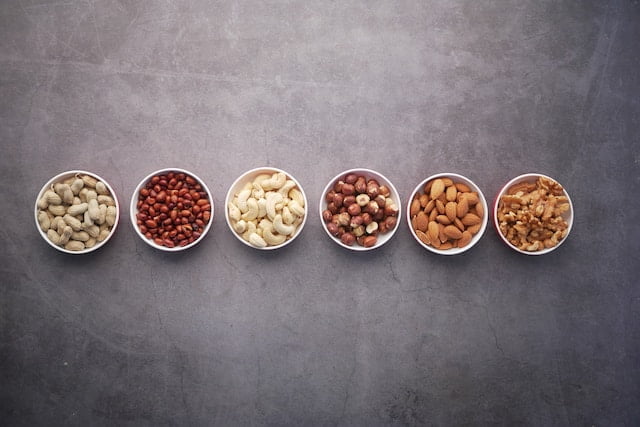Minerals are the substances that are essential for various physiological functions within the human body. From supporting bone health to enabling nerve signalling, minerals play a vital role in maintaining our overall well-being.
Here is the complete List of minerals and their natural sources along with the benefits and recommended dosage.
Calcium
Sources: Milk, Cheese, Yogurt, Tofu, Salmon, Broccoli, Kale, Fortified Juice
Benefits: This mineral helps in building and protecting bones, and teeth in addition to muscle contractions and relaxation. Calcium is also used for blood clotting and nerve impulse transmission.
Recommended dose: Adult Male- 1000mg, female- 1000mg

Chloride
Sources: Salt
Benefits: Chloride is useful in balancing fluids in our body and helps in digestion.
Recommended dose: Adult Male- 2.3g. Female- 2.3g

Chromium
Sources: Fish, Eggs, Meat, Cheese, Nuts, Potatoes, Cereals.
Benefits: This mineral plays an important role in enhancing the activity of insulin and in maintaining normal blood glucose levels.
Recommended dose: Adult Male- 35mcg. Female- 24 mcg
Copper
Sources: Nuts, Whole Grain, Beans, Liver, Seeds.
Benefits: In improving the immune system, iron metabolism and in making red blood cells.
Recommended dose: Adults Male- 900 mcg, Female-900 mcg

Fluoride
Sources: Marine Fish, Fluoridated Water.
Benefits: Fluoride mineral is essential In forming strong bones and keeping dental cavities away.
Recommended dose: Adults Male-4mg, Female- 3mg
Iodine
Sources: Iodized Salt, Seafood
Benefits: Iodine prevents thyroid disorders, intern helps in nerve and muscle functioning.
Recommended dose: Adults Male-150mcg, Female- 150mcg.
Iron
Sources: Eggs, Red Meat, Fruits, Fortified Grains
Benefits: Iron is very useful for haemoglobin in red blood cells to carry oxygen. It’s also beneficial for amino acid production and making hormones.
Recommended dose: Adult Male- 8mg, Female- 18mg

Magnesium
Sources: Milk, Spinach, Broccoli, Seeds like Sunflower, Cashews
Benefits: This mineral is needed for regulation of blood pressure, blood clotting, muscle contraction, building teeth and bones,
Recommended dose: Adult Male- 420mg, Female- 320mg
Manganese
Sources: Fish, Legumes, Nuts, Whole Grains
Benefits: Just like magnesium this mineral is helpful for bones and also to metabolise amino acids and carbohydrates.
Recommended dose: Adults Male-2.3mg, Female 1.8mg
Molybdenum
Sources: Milk, Legumes, Nuts and Grains.
Benefits: Although this mineral deficiency is very rare, it is essential to prevent neurological damage in infants.
Recommended dose: Male- 45mcg, Female 45mcg
Phosphorus
Sources: Diary products, Meat, Fish, Eggs, Broccoli, Almonds, Potatoes.
Benefits: This mineral is a part of DNA. Helps to convert food into energy. Helps in building and protecting bones and teeth.
Recommended dose: Adult Male-700mg, Female-700mg

Potassium
Sources: Milk, Meat, Fruits, Legumes, Vegetables
Benefits: Potassium lowers blood pressure along with maintaining a steady heartbeat and sends nerve impulses. It is also needed for muscle contractions in the body.
Recommended dose: Adult Male-4.7g, Female-4.7g
Selenium
Sources: Seafood, Walnuts, Meat Organs
Benefits: This mineral helps in stabilising molecules in cells and also regulates thyroid hormone activity.
Recommended dose: Adult Male- 55mcg, Female-55mcg.
Sodium
Sources: Salt, Vegetables
Benefits: It balances fluids in the body along with muscle contractions. Reduction in sodium leads to lower blood pressure in the body.
Recommended dose: Adult Male- 2300mg, Female-2300mg.

Sulfur
Sources: Meat, Fish, Chicken, Nuts, Legumes
Benefits: Sulfur mineral is very useful in maintaining healthy skin, hair and nails.
Recommended dose: It’s still unknown, as still studies are ongoing on humans.
Zinc
Sources: Red Meat, Oysters, Seafood, Beans, Nuts, Poultry.
Benefits: Zinc is one of the minerals that helps in creating new cells, building immunity along with helping in taste, smell and wound healing in our body.
Recommended dose: Adult Male-11mg, Female-8mg.

Here you have learned about Minerals and their sources, similarly, we have listed the complete set of Vitamins and their sources. Here is the list of Vitamins.
For more health-related content, check out our Health section.
